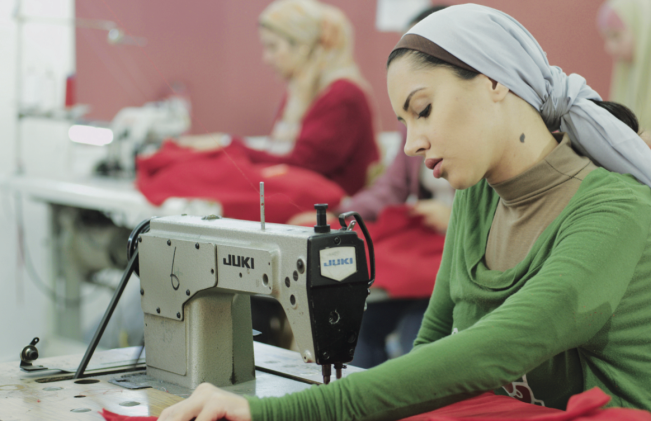
Director Mohamed Khan and leading lady Yasmin Raeis on their box office and festival hit
By Sherif Awad
One of the pioneers of the new realism movement in Egyptian cinema during the 1970s and 80s, veteran filmmaker Mohamed Khan has always directed great actresses in strong female roles, creating unforgettable features about Egyptian women facing many social challenges. His latest feature, Fatat el-Masnaa or Factory Girl, is no exception. The film has garnered not only critical acclaim, international awards and box office success throughout 2014, but it was also submitted as Egypt’s official pick for the 2015 Academy Awards’ Best Foreign Language Film category. It did not, however, make the nominees shortlist, which was released last month.
Factory Girl follows a year in the life of Hayam, played by Yasmin Raeis, a young woman working in one of Cairo’s textile factories. Searching for an escape from her dominating stepfather, Hayam dreams of tying the knot with the handsome Salah (Hany Adel), a factory supervisor who enjoys her attention and starts to be more intimate. But when a positive pregnancy test is discovered in the factory’s garbage, her coworkers and family assume that Hayam is a fallen woman. Her decision not to defend herself costs her dearly, as society refuses to accept independent women.
Released commercially in March 2014, the film was a box office hit, bringing in LE 1 million in just three weeks. “I think the word of mouth was behind the success of Factory Girl although it was free from A-List Egyptian stars,” Khan says. “The film deals with many women by trying to make a very clear image of Egyptian women in general. So we see many female characters in different age groups and degrees of kinship, such as the grandmother, the mother and the aunt.”
Factory Girl also spent the year on the festival circuit with a world premiere at the 2013 Dubai International Film Festival, where it won the FIPRESCI Prize for Best Arab Feature and Raeis won the Muhr Arab Award for Best Actress. Raeis also won the Best Actress Award at Sweden’s Malmö Arab Film Festival in September. Factory Girl also earned a Special Jury Prize at Italy’s MEDFilm Festival in July.
With Factory Girl, Khan continues his collaboration with his real-life significant other and frequent scriptwriter Wessam Soliman, after working together on Banat Wist El-balad (Downtown Girls, 2005) and Fi Shaket Masr El Gedeeda (In the Heliopolis Flat, 2007). The two worked on the script for a year, with Soliman researching the film by secretly working in a factory to experience a taste of daily life for the girls working there. The experience paid off, as Soliman won the Best Writing Award for Factory Girl at Morocco’s Sale Women Film Festival in April.
As the Best Actress awards attest, Raeis shines as Hayam, but she wasn’t actually Khan’s first choice for the role. While the director was familiar with her work in the TV series Third Party and the feature film A Whole One, Raeis still had to audition through a casting call. She won the role after delivering a good script reading and promising not to commit to any other work while shooting with Khan.
Like Soliman, Raies researched her role in a textile factory, where she worked at the sewing machine and learned the slang of the social class and work environment. She says she predicted the critical and financial success of Factory Girl: “I knew I was working with a great director and a good script. However, I did not think about receiving awards for my acting in it. But many people, men and women from different age groups and backgrounds, told me that they liked the film, which touched them on many levels.”
Next for Raeis is a new romantic drama called Balash Tebosny (Kiss Me Not), which co-stars Sawsan Badr and Mohamed Mahran. The plot takes place in a movie set, following a young director and his young starlet during the shooting of his highly publicized film. Kiss Me Not is written and directed by Ahmed Amer, who found himself in filmmaking after six years as a corporate banker.
Factory Girl was funded in part by the Egyptian Ministry of Culture. To make his budget stretch, Khan cut the production costs of sets and decoration by filming in a real apartment in an alley in one of Cairo’s urban neighborhoods, using small, lightweight equipment to get around inside the narrow passageways inside the buildings and apartment. This is part of his school that tends to shoot in real places around real people. Maybe that’s why the film resonated with the audience.
It could also be the film’s soundtrack. Because he directed the late, great Soad Hosny, the Cinderella of Egyptian Cinema, in the 1981 thriller A Dinner Date, Khan not only dedicated Factory Girl to her spirit but also used many of Hosny’s songs and radio interviews as a backdrop for Hayam’s poignant story.

Comments
Leave a Comment